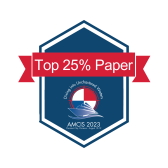Loading...
Paper Type
Complete
Description
Artificial Intelligence (AI) can significantly contribute to decentralizing and digitalizing the energy sector and environmental sustainability. Integrating AI-driven smart energy services (SES), such as energy production forecasting, building energy management, and predictive maintenance, remain in an early phase for plant providers or energy utilities. However, the knowledge regarding key factors determining the design of AI-driven SES is limited in the literature. Therefore, we derive critical success factors (CSFs) for the design of AI-driven SES in a design science research (DSR) approach in connection with the design thinking process. We identified ten CSFs and 31 CSF categories by iteratively combining the knowledge of interviewed AI business experts, scientific literature, and results of AI programming projects with students. Based on this, we developed a further research agenda containing six research demands and direct further research questions.
Paper Number
1808
Recommended Citation
Gerlach, Jana; Lier, Sarah Kristin; Hoppe, Paul; and Breitner, Michael H., "Critical Success Factors for AI-driven Smart Energy Services" (2023). AMCIS 2023 Proceedings. 14.
https://aisel.aisnet.org/amcis2023/sig_green/sig_green/14
Critical Success Factors for AI-driven Smart Energy Services
Artificial Intelligence (AI) can significantly contribute to decentralizing and digitalizing the energy sector and environmental sustainability. Integrating AI-driven smart energy services (SES), such as energy production forecasting, building energy management, and predictive maintenance, remain in an early phase for plant providers or energy utilities. However, the knowledge regarding key factors determining the design of AI-driven SES is limited in the literature. Therefore, we derive critical success factors (CSFs) for the design of AI-driven SES in a design science research (DSR) approach in connection with the design thinking process. We identified ten CSFs and 31 CSF categories by iteratively combining the knowledge of interviewed AI business experts, scientific literature, and results of AI programming projects with students. Based on this, we developed a further research agenda containing six research demands and direct further research questions.
When commenting on articles, please be friendly, welcoming, respectful and abide by the AIS eLibrary Discussion Thread Code of Conduct posted here.




Comments
SIG Green